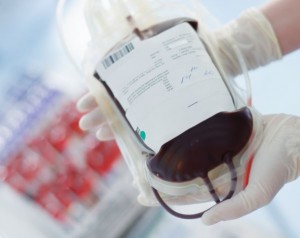 The decision by the Food and Drug Administration (FDA) to move forward with a long-awaited change to the current blood donation ban on gay and bisexual men has been met with mixed reactions.
The decision by the Food and Drug Administration (FDA) to move forward with a long-awaited change to the current blood donation ban on gay and bisexual men has been met with mixed reactions.
A deferral based policy utilizing a one year period of abstinence from same-sex sexual activity will be implemented, as recommended by the federal Advisory Committee on Blood and Tissue Safety Availability (ACBTSA), tasked with advising the Secretary of the Department of Health and Human Services.
David Stacy, HRC’s Government Affairs director said, “While this new policy is movement toward an optimal policy that reflects fundamental fairness and the best scientific research, it falls far short of an acceptable solution because it continues to stigmatize gay and bisexual men, preventing them from donating life-saving blood based solely on their sexual orientation, rather than a policy based on actual risk to the blood supply. This new policy cannot be justified in light of current scientific research and updated blood screening technology. We will continue to work towards an eventual outcome that both minimizes risk to the blood supply and treats gay and bisexual men with the respect they deserve.”
The Elton John AIDS Foundation, which recently awarded $3.2 million in grants that specifically address LGBT people of color and people living with HIV/AIDS in the South applauded the FDA for easing the restrictions. In a statement the Foundation said, “The Elton John AIDS Foundation is pleased that the FDA has taken a first step to lift the antiquated ban prohibiting gay men from donating blood. This announcement represents a long overdue shift in the public health field’s perception of gay men. While we urge the FDA to fully discard its ban, this step underscores what we have always believed: that all Americans, regardless of sexual orientation, should be allowed to help people in need. It’s part of ending stigma against LGBT Americans, and is simply the right thing to do.”
AIDS United, whose mission it is to end the AIDS epidemic in the United States, said that the deferred ban still needlessly discriminated against gay and bisexual men. Ronald Johnson, vice president of Policy and Advocacy at AIDS United said, “The lifetime ban on gay men donating blood has not made sense for decades, but this first step is not enough. We call on the FDA to move to an individualized, comprehensive and effective deferral system for all donors based on actual – not perceived – risk.”
AIDS United also urged the FDA to move forward with the implementation of a hemovigilance system to track, report, investigate and analyze risks and adverse reactions that can occur as a result of blood transfusion. Such a system would increase the safety of the blood supply and provide an early warning system for potential threats.
“AIDS United aligns itself with our friends in the hemophilia and blood products recipient communities to strongly urge the FDA to move forward on a hemovigilance system that increases the safety of the blood supply,” continued Johnson. “We urge the FDA to take these steps to improve the safety of our blood supply without perpetuating discrimination against gay and bisexual men.”
Anthony Fauci, director of the National Institutes of Health’s National Institute of Allergy and Infectious Diseases, said, “There’s no doubt about it, that any way that you can safely add to the pool of donors to counter this chronic shortage of blood is a good thing.”
The proposed rule change will now proceed through the federal regulatory channels requiring notice and allowing for public comment. Administration officials will initiate that process in 2015.











